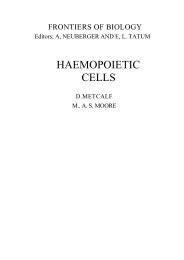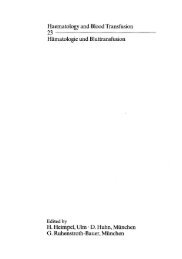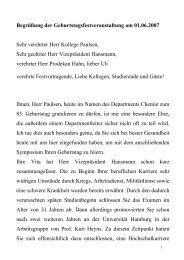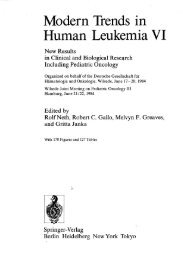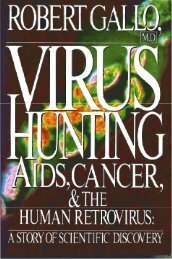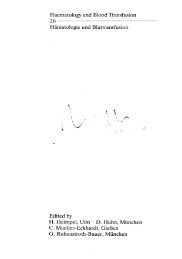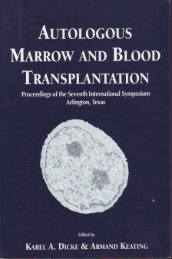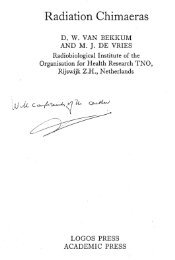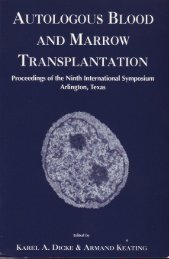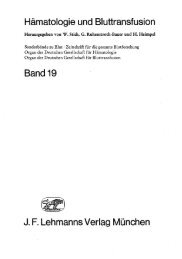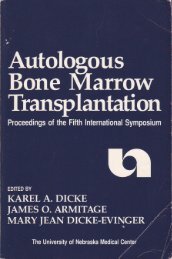- Page 1:
AUTOLOGOUS BLOOD AND MARROW TRANSPL
- Page 5 and 6:
AUTOLOGOUS BLOOD AND MARROW TRANSPL
- Page 7:
ACKNOWLEDGMENTS We wish to thank Wi
- Page 11:
THE VAN BEKKUM STEM CELL AWARD Prof
- Page 14 and 15:
xii Table of Contents CHAPTER 2: AL
- Page 16 and 17:
xiv Table of Contents Late Non-Rela
- Page 18 and 19:
xvi Table of Contents Pretreatment
- Page 20 and 21:
xviii Table of Contents CHAPTER 7:
- Page 22 and 23:
XX Table of Contents Long-Term Obse
- Page 24 and 25:
xxii Table of Contents CHAPTER 13:
- Page 27 and 28:
0-9 LIST OF ABBREVIATIONS 2CDA 2-ch
- Page 29 and 30:
List of Abbreviations xxvii EFS eve
- Page 31 and 32:
List of Abbreviations MOPP mechlore
- Page 33:
VOD veno-occlusive disease VPC viru
- Page 37 and 38:
4HC-Purged Autologous Stem Cell Tra
- Page 39 and 40:
1.0-1 + 0.2 Miller et al. 5 Event F
- Page 41 and 42:
Miller et al. Adjusted probability
- Page 43 and 44:
Who Benefits From Autograft in AML
- Page 45 and 46:
Burnett 11 which to set the transpl
- Page 47 and 48:
Table 1. Outcome after relapse in M
- Page 49 and 50:
Immunotherapy in AML: No Positive E
- Page 51 and 52:
Simonsson et al. inhibit IL-2 induc
- Page 53 and 54:
Autologous Bone Marrow Transplantat
- Page 55 and 56:
Ball et al. 21 CD15) and AML-2-23 (
- Page 57 and 58:
Ball et al. 23 The ex vivo treatmen
- Page 59 and 60:
Ball et al. 25 Table 2. Factors inv
- Page 61 and 62:
Ball et al. Overall Survival for Pa
- Page 63 and 64:
Ball et al. Overall Survival for Pa
- Page 65 and 66:
Ball et al. 31 Overall Survival for
- Page 67 and 68:
Ball et al. Table 4. Actuarial over
- Page 69 and 70:
Ball et al. myeloid leukemia. The G
- Page 71 and 72:
Ball et al. 1993. 38. Mehta J, Powl
- Page 73 and 74:
Can Autologous Stem Cell Transplant
- Page 75 and 76:
De Witte et al. 41 novo AML. Auer r
- Page 77 and 78:
De Witte et al. hematopoietic engra
- Page 79 and 80:
De Witte et al. 23. Fenaux P, Laï
- Page 81 and 82:
Stein et al. and fever. No patient
- Page 83 and 84:
Stein et al. after doses 1, 3, and
- Page 85 and 86:
Stein et al. early after the transp
- Page 87:
autologous stem-cell rescue. / Clin
- Page 91 and 92:
Bone Marrow Transplantation for Acu
- Page 93 and 94:
Table 2. Autologous BMT in ALL in f
- Page 95 and 96:
Rowe 61 or adult patients with acut
- Page 97 and 98:
Hoelzer and Gôkbuget minitransplan
- Page 99 and 100:
Hoelzer and Gdkbuget 65 blood, earl
- Page 101 and 102:
Table 3. Risk factors for the defin
- Page 103 and 104:
Hoelzer and Gôkbuget treatment opt
- Page 105 and 106:
Hoeker and Gökbuget tical sibling
- Page 107 and 108:
Sierra et al. INTRODUCTION Two-thir
- Page 109 and 110:
Sierra et al. Table 2. Adverse char
- Page 111 and 112:
1,0 0,0 J Sierra et al. 0 20 40 60
- Page 113 and 114:
Sierra et al. Months Figure 4 < 30,
- Page 115 and 116:
Sierra et al. No adverse factors (n
- Page 117 and 118:
1994. Sierra et al. 83 10. Canals C
- Page 119 and 120:
Martin, Atta, and Hoelzer 85 adult
- Page 121 and 122:
Martin, Atta, and Hoelzer 87 Single
- Page 123 and 124:
100. Martin, Atta, and Hoelzer 89 P
- Page 125 and 126:
Martin, Atta, and Hoelzer 91 chromo
- Page 127 and 128:
Autologous vs. Unrelated Allogeneic
- Page 129 and 130:
Boyer and Yeager 95 outcomes after
- Page 131 and 132:
Boyer and Y eager 97 Table 2. Hypot
- Page 133 and 134:
Boyer and Y eager SUMMARY Most of t
- Page 135:
CHAPTER 3 CML
- Page 138 and 139:
Autograft Followed by Allograft Wit
- Page 140 and 141:
106 Chapter 3: CML (one low-grade a
- Page 142 and 143:
108 Chapter 3: CML DISCUSSION Myelo
- Page 144 and 145:
110 Chapter 3: CML Philadelphia-neg
- Page 146 and 147:
The Case for Manipulation of CML Au
- Page 148 and 149:
Toward a Cure by Drug Treatment? Th
- Page 150 and 151:
116 Chapter 3 :CML Table 1. Prolong
- Page 152 and 153:
118 Chapter 3: CML Table 3. German
- Page 154 and 155:
120 Chapter 3: CML Table 5. Normal
- Page 156 and 157:
122 Chapter 3: CML Table 8. Surviva
- Page 158 and 159:
124 Chapter 3: CML 88:3118-3122, 19
- Page 160 and 161:
126 Chapter 3: CML RK, Klingemann H
- Page 162 and 163:
The Tyrphostin AG957 Inhibits the I
- Page 164 and 165:
130 Chapter 3: CML mobilization. Al
- Page 166 and 167:
132 Chapter 3: CML A B 100 n 0 1 5
- Page 168 and 169:
134 Chapter 3: CML The in vitro sel
- Page 170 and 171:
136 Chapter 3: CML detecting leukem
- Page 173 and 174:
Progressive Hodglcin's Lymphoma Fol
- Page 175 and 176:
Reece et al. survival is observed i
- Page 177 and 178:
0.2 -I 0.0 0 Reece et al. 143 ii i
- Page 179 and 180:
Reece et al. Table 3. Causes of non
- Page 181 and 182:
Reece et al. carmustine, etoposide
- Page 183 and 184:
CD34 + Selection of Hematopoietic B
- Page 185 and 186:
Lazarus et al. 151 significantly de
- Page 187 and 188:
Lazarus et al. 153 (Sigma, St Louis
- Page 189 and 190:
Lazarus et al. 155 Table 2. Effect
- Page 191 and 192:
Lazarus et al. 157 difference. Furt
- Page 193 and 194:
Lazarus et al. 159 cells after myel
- Page 195 and 196:
The European CUP/UP Trial: A Prelim
- Page 197 and 198:
Table 1. Patient characteristics at
- Page 199 and 200:
Schouten et al. licular non-Hodgkin
- Page 201 and 202:
Sweetenham et al. vs. autologous pe
- Page 203 and 204:
Table 1. Patient characteristics, g
- Page 205 and 206:
Table 2. Patient characteristics, g
- Page 207 and 208:
Table 3. Sites of relapse, group A
- Page 209 and 210:
Table 4. Patterns of relapse, group
- Page 211 and 212:
A 100 80 %OS 60 40 20 B 100 %OS | S
- Page 213 and 214:
Sweetenham et al. new sites, and fi
- Page 215 and 216:
Sweetenham et al. Treatment options
- Page 217 and 218:
Molecular Remission: A Worthwhile A
- Page 219 and 220:
Early or Late Autotransplant in Hig
- Page 221 and 222:
Schenkein et al. 187 PATIENTS AND M
- Page 223 and 224:
Schenkein et al. 189 Toxicity Toxic
- Page 225 and 226:
Schenkein et al. 191 16. Glick JH,
- Page 227 and 228:
Santini et al. 193 to evaluate the
- Page 229 and 230:
Table 1. Continued Santini et al. 1
- Page 231 and 232:
Santini et al. 197 cytosine arabino
- Page 233 and 234:
1 0 0 1 90- 80- 70- (0 u. 60' o so-
- Page 235 and 236:
Hodgkin's lymphoma. N EnglJ Med 333
- Page 237:
CHAPTER 5 MYELOMA
- Page 240 and 241:
206 Chapter 5: Myeloma independent
- Page 242 and 243:
208 Chapter 5: Myeloma disease (MRD
- Page 244 and 245:
210 Chapter 5: Myeloma Scandinavia,
- Page 246 and 247:
212 Chapter 5: Myeloma (0 n o B co
- Page 248 and 249:
214 Chapter 5: Myeloma B cq d ? o c
- Page 250 and 251:
216 Chapter 5: Myeloma patients wit
- Page 252 and 253:
218 Chapter 5: Myeloma PBSC transpl
- Page 254 and 255:
220 Chapter 5: Myeloma 25. Seiden M
- Page 256 and 257:
Autologous Transplantation in Multi
- Page 258 and 259:
224 Chapter 5: Myeloma 0 52 44 U §
- Page 260 and 261:
226 Chapter 5: Myeloma BM ^ (CD34±
- Page 262 and 263:
228 Chapter 5: Myeloma IFM 94 : OS
- Page 264 and 265:
230 Chapter 5: Myeloma two groups a
- Page 266 and 267:
232 Chapter 5: Myeloma increase bot
- Page 268 and 269:
234 Chapter 5: Myeloma REFERENCES 1
- Page 270 and 271:
236 Chapter 5: Myeloma Intensified
- Page 272 and 273:
238 Chapter 5: Myeloma of CD34 + ce
- Page 274 and 275:
Chapter 5: Myeloma Table 2. Descrip
- Page 276 and 277:
242 Chapter 5: Myeloma o 8H 0 2 4 6
- Page 278 and 279:
244 Chapter 5: Myeloma ated with sh
- Page 281 and 282:
The Presence of Micrometastases in
- Page 283 and 284:
Kvalheim et al. 249 Table 1. Immuno
- Page 285 and 286:
Kvalheim et al. 251 Figure 1. Sixty
- Page 287 and 288:
Kvalheim et al. 253 DISCUSSION In t
- Page 289 and 290:
Kvalheim et al. 255 Bastert G: Micr
- Page 291 and 292:
Hood et al. 257 In an effort to inc
- Page 293 and 294:
#CD34 + cells in blood = Hood et al
- Page 295 and 296:
Hood et al. 261 Table 3. Frequency
- Page 297 and 298:
Hood et al. 263 REFERENCES 1. Rill
- Page 299 and 300:
The Clinical Significance of Breast
- Page 301 and 302:
Moss et al. tests, and bilateral po
- Page 303 and 304:
Moss et al. 269 0 15 70 143 200 400
- Page 305 and 306:
Moss et al. 271 0 3 6 12 18 24 30 3
- Page 307 and 308:
Moss et al. 273 8. Passos-Coelho J,
- Page 309 and 310:
Autotransplantation for Men With Br
- Page 311 and 312:
McCarthy et al. 277 radiation, two
- Page 313 and 314:
High Dose Sequential Chemotherapy W
- Page 315 and 316:
Viens et al. 281 3 g/m 2 and doxoru
- Page 317 and 318:
Table 1. Tumor characteristics Exte
- Page 319 and 320:
Table 4. Response Viens et al. 285
- Page 321 and 322:
Viens et al. 287 Table 5. Pathologi
- Page 323 and 324:
Viens et al. 289 apy for inoperable
- Page 325 and 326:
Gliick et al. 291 INTRODUCTION The
- Page 327 and 328:
Gluck et al. 293 RESULTS Patient de
- Page 329 and 330:
Glück et al. 295 Table 3. Response
- Page 331 and 332:
Gluck et al. 297 Overall Survival O
- Page 333 and 334:
Gluck et al. 299 Sudbury patients w
- Page 335 and 336:
Gluck et al. 301 anthracycline or t
- Page 337 and 338:
Repetitive High-Dose Therapy With P
- Page 339 and 340:
Prince et al. paramagnetic separati
- Page 341 and 342:
Prince et al. Table 1. High-dose re
- Page 343 and 344:
Table 2. Patient characteristics (n
- Page 345 and 346:
Table 4. Hematopoietic recovery fol
- Page 347 and 348:
1.0- M C .S 0.8- a c *fe o o> 0.6-
- Page 349 and 350:
M 1.0 I 0.8H s? VI o.6H S 0.2 0.0 P
- Page 351 and 352:
a Prince et al. days to platelets >
- Page 353 and 354:
Table 5. Results of Isolex 300i CD3
- Page 355 and 356:
Prince et al. 321 Figure 5, continu
- Page 357 and 358:
Prince et al. 323 months after tran
- Page 359 and 360:
Prince et al. 325 excessive to be u
- Page 361 and 362:
Prince et al. 327 eight patients ha
- Page 363 and 364:
Prince et al. 329 marrow transplant
- Page 365 and 366:
Prince et al. intensive chemotherap
- Page 367 and 368:
-Q CO .Q O 1.0 0.9 0.8 0.7 0.6 0.5
- Page 369 and 370:
.Q CD .Q O 1.0 0.9 0.8 0.7 0.6 0.5
- Page 371 and 372:
oba Q. 1.0 0.9 Dicke et al. Stage I
- Page 373 and 374:
Vahdat with peripheral blood progen
- Page 375 and 376:
Evaluation of Prognostic Factors fo
- Page 377 and 378:
Fields et al. 343 PATIENTS AND METH
- Page 379 and 380:
Table 1. Chemotherapy regimens. Fie
- Page 381 and 382:
Fields et al. Stage II; 4-9 Pos LN
- Page 383 and 384:
U U Fields et al.
- Page 385 and 386:
Fields et al. 351 between 1 and 2 y
- Page 387 and 388:
European Trends and the EBMT Databa
- Page 389 and 390:
25% % 22% / 17% \ Rosti et al. 355
- Page 391 and 392:
Rosti et al. 357 The new Italian St
- Page 393 and 394:
- Page 395 and 396:
Rosti et al. 6. Haas R, Schmid H, H
- Page 397 and 398:
Bewick et al. 363 INTRODUCTION The
- Page 399 and 400:
Bewick et al. 365 Blood samples obt
- Page 401 and 402:
Bewick et al. 367 HDCT with ABSC su
- Page 403 and 404:
Bewick et al. Progression Free Surv
- Page 405 and 406: Bewick et al. pression in MBC, i.e.
- Page 407 and 408: Bewick et al. 14. Kandl HL, Seymour
- Page 409: CHAPTER 7 OTHER SOLID TUMORS
- Page 412 and 413: 378 Chapter 7: Solid Tumors INTRODU
- Page 414 and 415: 380 Chapter 7: Solid Tumors Prepara
- Page 416 and 417: 382 Chapter 7: Solid Tumors Surviva
- Page 418 and 419: 384 Chapter 7: Solid Tumors months
- Page 420 and 421: 386 Chapter 7: Solid Tumors have be
- Page 422 and 423: High-Dose Chemotherapy in the Manag
- Page 424 and 425: 390 Chapter 7: Solid Tumors followe
- Page 426 and 427: 392 Chapter 7: Solid Tumors Table 1
- Page 428 and 429: 394 Chapter 7: Solid Tumors (mucosi
- Page 430 and 431: Three-Fold Intensification by Seque
- Page 432 and 433: 398 Chapter 7: Solid Tumors Table 2
- Page 434 and 435: 400 Chapter 7: Solid Tumors Table 4
- Page 436 and 437: High-Dose Therapy for Small Cell Lu
- Page 438 and 439: 404 Chapter 7: Solid Tumors chemoth
- Page 440 and 441: 406 Chapter 7: Solid Tumors SCLC ha
- Page 442 and 443: 408 Chapter 7: Solid Tumors relapse
- Page 444 and 445: 410 Chapter 7: Solid Tumors 69:585-
- Page 446 and 447: 412 Chapter 7: Solid Tumors ogous b
- Page 448 and 449: 414 Chapter 7: Solid Tumors 64. Bru
- Page 450 and 451: 416 Chapter 7: Solid Tumors Prignot
- Page 452 and 453: 418 Chapter 7: Solid Tumors CO > CO
- Page 454 and 455: 420 Chapter 7: Solid Tumors TANDEM
- Page 458 and 459: 424 Chapter 7: Solid Tumors and the
- Page 460 and 461: 426 Chapter 7: Solid Tumors Thiotep
- Page 462 and 463: 428 Chapter 7: Solid Tumors Table 2
- Page 464 and 465: 430 Chapter 7: Solid Tumors E 100 0
- Page 466 and 467: 432 Chapter 7: Solid Tumors course
- Page 468 and 469: 434 Chapter 7: Solid Tumors boplati
- Page 470 and 471: 436 Chapter 7: Solid Tumors INTRODU
- Page 472 and 473: 438 - Chapter 7: Solid Tumors Table
- Page 474 and 475: 440 Chapter 7: Solid Tumors seeded
- Page 476 and 477: 442 Chapter 7: Solid Tumors DISCUSS
- Page 478 and 479: 444 Chapter 7: Solid Tumors 10. Di
- Page 480 and 481: 446 Chapter 7: Solid Tumors plasma
- Page 483 and 484: Autologous Stem Cell Transplantatio
- Page 485 and 486: Keystone 451 hypertension, anemia,
- Page 487 and 488: Fassas et al. 453 INTRODUCTION Mult
- Page 489 and 490: Fassas et al. Table 2. Stem cell mo
- Page 491 and 492: Table 3. Toxicity after stem cell i
- Page 493 and 494: Fassas et al. Table 5. Trial 1: cha
- Page 495 and 496: Fassas et al. MS PROGRESSION FREE S
- Page 497 and 498: Fassas et al. ic or autologous bone
- Page 499 and 500: 1 2 1 6 EAE. Burt et al. 465 Becaus
- Page 501 and 502: Burt et al. Since cyclophosphamide
- Page 503 and 504: Burt et al. 469 toxicity study, we
- Page 505 and 506: Burt et dl. All 23. Mor F, Cohen IR
- Page 507 and 508:
Hasler, Gratwohl, and Tyndall an ev
- Page 509 and 510:
Hasler, Gratwohl, and Tyndall 475 B
- Page 511 and 512:
Kuis, Wulffraat, and Sanders 477 st
- Page 513 and 514:
Kuis, Wulffraat, and Sanders neousl
- Page 515:
CHAPTER 9 LONG-TERM EFFECTS
- Page 518 and 519:
484 Chapter 9: Long-Term Effects po
- Page 520 and 521:
486 Chapter 9: Long-Term Effects Ta
- Page 522 and 523:
488 Chapter 9: Long-Term Effects ml
- Page 524 and 525:
490 Chapter 9: Long-Term Effects 4.
- Page 526 and 527:
492 Chapter 9: Long-Term Effects us
- Page 528 and 529:
494 Chapter 9: Long-Term Effects AB
- Page 530 and 531:
496 Chapter 9: Long-Term Effects Ta
- Page 532 and 533:
498 Chapter 9: Long-Term Effects En
- Page 534 and 535:
500 Chapter 9: Long-Term Effects Rl
- Page 536 and 537:
502 Chapter 9: Long-Term Effects RE
- Page 538 and 539:
504 Chapter 9: Long-Term Effects A,
- Page 540 and 541:
Long-Term Follow-Up of Autologous T
- Page 542 and 543:
508 Chapter 9: Long-Term Effects Ta
- Page 545:
CHAPTER 10 GRAFT MANIPULATION
- Page 548 and 549:
514 Chapter 10: Graft Manipulation
- Page 550 and 551:
516 Chapter 10: Graft Manipulation
- Page 552 and 553:
518 Chapter 10: Graft Manipulation
- Page 554 and 555:
520 Chapter 10: Graft Manipulation
- Page 556 and 557:
522 Chapter 10: Graft Manipulation
- Page 558 and 559:
524 Chapter 10: Graft Manipulation
- Page 560 and 561:
526 Chapter 10: Graft Manipulation
- Page 562 and 563:
528 Chapter 10: Graft Manipulation
- Page 564 and 565:
530 Chapter 10: Graft Manipulation
- Page 566 and 567:
532 Chapter 10: Graft Manipulation
- Page 568 and 569:
534 Chapter 10: Graft Manipulation
- Page 570 and 571:
536 Chapter 10: Graft Manipulation
- Page 572 and 573:
538 Chapter 10: Graft Manipulation
- Page 574 and 575:
540 Chapter 10: Graft Manipulation
- Page 576 and 577:
542 Chapter 10: Graft Manipulation
- Page 578 and 579:
544 Chapter 10: Graft Manipulation
- Page 580 and 581:
546 Chapter 10: Graft Manipulation
- Page 582 and 583:
548 Chapter 10: Graft Manipulation
- Page 584 and 585:
550 Chapter 10: Graft Manipulation
- Page 586 and 587:
552 Chapter 10: Graft Manipulation
- Page 588 and 589:
554 Chapter 10: Graft Manipulation
- Page 590 and 591:
556 Chapter 10: Graft Manipulation
- Page 592 and 593:
558 Chapter 10: Graft Manipulation
- Page 594 and 595:
560 Chapter 10: Graft Manipulation
- Page 596 and 597:
562 Chapter 10: Graft Manipulation
- Page 598 and 599:
564 Chapter 10: Graft Manipulation
- Page 600 and 601:
566 Chapter 10: Graft Manipulation
- Page 602 and 603:
568 Chapter 10: Graft Manipulation
- Page 604 and 605:
570 Chapter 10: Graft Manipulation
- Page 606 and 607:
Stem Cell Reinfusion Over Two Conse
- Page 608 and 609:
574 Chapter 10: Graft Manipulation
- Page 610 and 611:
576 Chapter 10: Graft Manipulation
- Page 612 and 613:
578 Chapter 10: Graft Manipulation
- Page 614 and 615:
Final Report of the First Prospecti
- Page 616 and 617:
582 Chapter 10: Graft Manipulation
- Page 618 and 619:
584 Chapter 10: Graft Manipulation
- Page 620 and 621:
586 Chapter 10: Graft Manipulation
- Page 622 and 623:
588 Chapter 10: Graft Manipulation
- Page 624 and 625:
590 Chapter 10: Graft Manipulation
- Page 626 and 627:
592 Chapter 10: Graft Manipulation
- Page 628 and 629:
594 Chapter 10: Graft Manipulation
- Page 630 and 631:
596 Chapter 10: Graft Manipulation
- Page 632 and 633:
598 Chapter 10: Graft Manipulation
- Page 635 and 636:
Canine Hematopoietic Stem Allograft
- Page 637 and 638:
Sandmaier et al. 603 The resultant
- Page 639 and 640:
Sandmaier et al. 605 synthesis path
- Page 641 and 642:
Sandmaier et al. 607 interactions o
- Page 643 and 644:
Sandmaier et al. 1991. 2. Burchenal
- Page 645 and 646:
87:3508-3513,1996. Sandmaier et al.
- Page 647 and 648:
Giralt, Khouri, and Champlin Table
- Page 649 and 650:
Giralt, Khouri, and Champlin seven
- Page 651 and 652:
1.0 3 0.2 Giralt, Khouri, and Champ
- Page 653:
CHAPTER 12 GENE THERAPY
- Page 656 and 657:
622 Chapter 12: Gene Therapy INTROD
- Page 658 and 659:
624 Chapter 12: Gene Therapy RESULT
- Page 660 and 661:
626 Chapter 12: Gene Therapy envisi
- Page 662 and 663:
628 Chapter 12: Gene Therapy cer in
- Page 664 and 665:
A Vaccine of Melanoma Peptide Loade
- Page 667 and 668:
B43(anti-CD 19)-Gen i stein Immunot
- Page 669 and 670:
Targeting Immunotherapy for the Tre
- Page 671 and 672:
McGuinness andArceci 637 modified m
- Page 673 and 674:
McGuinness andArceci 639 leukemic c
- Page 675 and 676:
McGuinness and Arced 641 in G418. T
- Page 677 and 678:
McGuinness andArceci 643 Figure 2
- Page 679 and 680:
mRNA for hB7-1 (1491 bp) mRNA for C
- Page 681 and 682:
McGuinness and Arced CD80PE C080PE
- Page 683 and 684:
McGuinness andArceci 649 8. Robert
- Page 685 and 686:
McGuinness andArceci immune respons
- Page 687 and 688:
McGuinness andArceci 75. Jubinsky F
- Page 689 and 690:
Slavin et al. 655 up suggests, as p
- Page 691 and 692:
Slavin et al. 657 was a phase lib c
- Page 693 and 694:
Slavin et al. presented, appears to
- Page 695 and 696:
Antitumor Immunotherapy in Autologo
- Page 697 and 698:
Klingemann et al. 663 Table 3. Meth
- Page 699:
CHAPTER 14 RADIOIMMUNOTHERAPY
- Page 702 and 703:
668 Chapter 14: Radioimmunotherapy
- Page 704 and 705:
670 Chapter 14: Radioimmunotherapy
- Page 706 and 707:
672 Chapter 14: Radioimmunotherapy
- Page 708 and 709:
674 Chapter 14: Radioimmunotherapy
- Page 710 and 711:
676 Chapter 14: Radioimmunotherapy
- Page 712 and 713:
678 Chapter 14: Radioimmunotherapy
- Page 714 and 715:
Selection of Radioisotopes, Chelate
- Page 716 and 717:
682 Chapter 14: Radioimmunotherapy
- Page 718 and 719:
684 Chapter 14: Radioimmunotherapy
- Page 720 and 721:
686 Chapter 14: Radioimmunotherapy
- Page 722 and 723:
688 Chapter 14: Radioimmunotherapy
- Page 724 and 725:
690 Chapter 14: Radioimmunotherapy
- Page 726 and 727:
Radioimmunotherapy of Common Epithe
- Page 729:
CHAPTER 15 NEW AVENUES
- Page 732 and 733:
698 Chapter 15: New Avenues Table 1
- Page 734 and 735:
700 Chapter 15: New Avenues An alte
- Page 736 and 737:
702 Chapter 15: New Avenues who can
- Page 738 and 739:
704 Chapter 15: New Avenues myeloid
- Page 740 and 741:
706 Chapter 15: New Avenues 48. Gir
- Page 742 and 743:
Emerging Viral Infections in Blood
- Page 744 and 745:
710 Chapter 15: New Avenues influen
- Page 746 and 747:
712 Chapter 15: New Avenues Among a
- Page 748 and 749:
714 Chapter 15: New Avenues physica
- Page 750 and 751:
716 Chapter 15: New Avenues respira
- Page 752 and 753:
Minimal Therapy Models of Transplan
- Page 755:
CHAPTER 16 SUMMARIES
- Page 758 and 759:
724 Chapter 16: Summaries although
- Page 760 and 761:
726 Chapter 16: Summaries use of po
- Page 762 and 763:
728 Chapter 16: Summaries Table 1.
- Page 764 and 765:
730 Chapter 16: Summaries Table 1.
- Page 766 and 767:
732 Chapter 16: Summaries Table 2.
- Page 768 and 769:
734 Chapter 16: Summaries Table 4.
- Page 770 and 771:
736 Chapter 16: Summaries IL-15. Th
- Page 772 and 773:
738 Chapter 16: Summaries Patterns
- Page 774 and 775:
740 List of Participants Thomas L.
- Page 776 and 777:
742 List of Participants Sergio A.
- Page 778 and 779:
744 List of Participants Hans Marti
- Page 780 and 781:
746 List of Participants David P. S
- Page 782 and 783:
748 List of Participants AUTHOR IND
- Page 784 and 785:
750 Author Index Hurd, D.D. 483 Kui
- Page 786 and 787:
752 Author Index Stiff, Patrick J.
- Page 788 and 789:
754 Key Word Index Hematologic mali
- Page 792:
ISBN 1-891524-04-6



